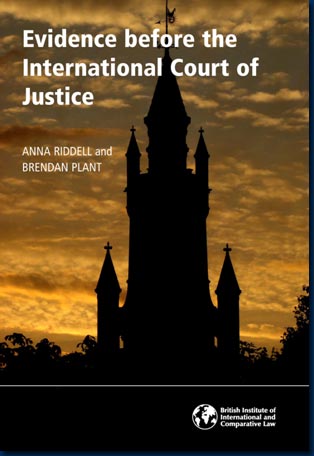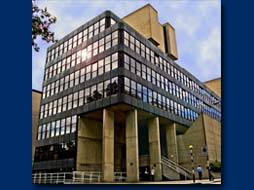|
NEWSLETTER SPRING 2009
Registered charity (No 209425)
|
 |
|
|
Director's Notes

The green shoots of growth have begun to appear!
Of course at the
moment they are due to the season rather than
the economy, sadly, as the global financial
crisis continues to affect the financial
situation of many people and organizations
across the world. The calls for better
regulation of the international financial
markets and for better international powers for
the market regulators reinforce the need for the
Institute as a body committed to the development
and practical application of international and
comparative law, including in international
financial matters.
The Institute is also affected by the financial
situation, as some of its regular and potential
sponsors are facing their own difficulties and
are understandably cautious, which has an impact
on our research projects and events. However,
the Institute continues to work to ensure that
its expenditure is controlled and effective, and
it seeks appropriate income generation. At the
same time, our development campaigns continue
with some very generous donations. A report from
our Development Director, Rozelyn Bristowe is
given in this Newsletter. Roz has taken over
this role, after extensive experience in related
sectors, with Diane Denny having given birth to
a boy in March (and both are doing well).
We were delighted with the publication of
Evidence before the International Court of
Justice, written by two of our Research
Fellows, Anna Riddell and Brendan Plant. This
was a culmination of many years of research
assisted by the commitment of a number of our
members, in particular Dame Rosalyn Higgins, Sir
Frank Berman, Sir Michael Wood and Philippe
Sands QC. If you are interested in this book,
then please contact our
publications team. Another research project
that was completed in the past few months was a
comparative approach to ‘public authorities’
under the European Convention on Human Rights.
We have also held a range of events, one of the
highlights being the last three lectures by Yves
Fortier CC QC (former Canadian Ambassador to the
UN) and Norah Gallagher (of the Institute) on
‘Investment Protection and the Rule of Law’, as
part of the 50th Anniversary series. The last
two Lectures in the series were held at the
Institute: Uses and Abuses of Comparative Tort
Law: Professor Jane Stapleton (ANU and Texas),
Professor Jeroen Kortmann (Amsterdam) and Duncan
Fairgrieve of the Institute—on Thursday 23 April
at 5.30pm; and International Cooperation and the
Modern Prosecutor—Keir Starmer QC (Director of
Public Prosecutions) and Sarah Williams of the
Institute—on Tuesday 2 June at 5.30pm.
Best wishes for a bountiful spring.
Professor Robert McCorquodale
Institute Director
|
|
|
|
|
|
|
The Institute is running a Development Appeal, with two principal objectives, to raise funds, respectively, for the Bingham Centre for the Rule of Law and for the Sir Arthur Watts Research Fellowship in Public International Law.
|
BINGHAM CENTRE FOR THE RULE OF LAW
 As
you may recall, in November 2008, the Institute
announced the Bingham Appeal. The Appeal has already
received donations of more than £325,000 towards a goal
of £1.3 million for the establishment of the Bingham
Centre for the Rule of Law for five years. Patrons
include Hon Mr Justice Arthur Chaskalson, His Excellency
Jean-Paul Costa, The Rt Hon Mr Justice Michael de la
Bastide, The Rt Hon Sir David Edward KCMG, The Hon Chief
Justice Robert French, The Rt Hon Lord Judge CJ, Her
Excellency Dame Rosalyn Higgins DBE QC, The Hon Mr
Justice Andrew Li Kwok-nang, The Rt Hon Lord Phillips of
Worth Matravers, Mahmoud
Salih, The Rt Hon Beverley McLachlin, His Excellency Prof Vassilios Skouris, and Sir
Peter Sutherland. As
you may recall, in November 2008, the Institute
announced the Bingham Appeal. The Appeal has already
received donations of more than £325,000 towards a goal
of £1.3 million for the establishment of the Bingham
Centre for the Rule of Law for five years. Patrons
include Hon Mr Justice Arthur Chaskalson, His Excellency
Jean-Paul Costa, The Rt Hon Mr Justice Michael de la
Bastide, The Rt Hon Sir David Edward KCMG, The Hon Chief
Justice Robert French, The Rt Hon Lord Judge CJ, Her
Excellency Dame Rosalyn Higgins DBE QC, The Hon Mr
Justice Andrew Li Kwok-nang, The Rt Hon Lord Phillips of
Worth Matravers, Mahmoud
Salih, The Rt Hon Beverley McLachlin, His Excellency Prof Vassilios Skouris, and Sir
Peter Sutherland.
The Bingham Centre would be the first institution in the
world focused solely on developing the of law,
understanding it—and the threats that it faces,
providing an intellectual framework within which it can
operate and creating the legal and policy tools to
support it. The Centre will carry out research and
training, with a view to influencing policy and law
reform around the world, through lectures, publications
and seminars.
|
The Centre’s governance and staffing will
include:
- The Rt Hon Lord
Bingham of Cornhill KG, Life President
- Director of the Bingham
Centre for the Rule of Law
- An additional
Senior Research Fellow and at least two
additional Research Fellows
- Visiting Fellows,
including some of the most eminent people in
this field
- Talented interns
from around the world (supported by a
bursary system)
|
 |
This is an important
project, supported at the highest level of academia, the
legal profession, the judiciary, international
organizations and business. Properly funded, it has the
possibility to make a profound and prolonged
contribution to the
development of the society in which we live. Our sincere
thanks go to Freshfields Bruckhaus Deringer, the Dorset
Foundation, the Peter Cruddas Foundation, the BIICL
Trustees and those members of the Judiciary and the Bar
who have already supported our appeal. To make a
donation or to offer support, please contact
Roz Bristowe via email or telephone on 020 7664 4871.
|
|
SIR ARTHUR WATTS RESEARCH FELLOWSHIP
 |
The Institute’s appeal for the Sir
Arthur Watts Research Fellowship in
Public International Law aims to honour
the memory of the late Sir Arthur Watts,
widely regarded as one of the foremost
public international lawyers of his
generation, to secure the place of
public international law as a core
element of the Institute’s work, and to
reflect the special focus Sir Arthur had
on the practical operation of public
international law founded on a deep
knowledge of the law. |
|
|
Areas featuring in the Institute’s
current programme of research and
events include:
- Damages in
International Law
- Evidence before
International Courts and Tribunals
- Comparative
International Law
-
Human Rights in Iran
|
 |
|
One of
the principal duties of the Fellow will be to
develop and expand this programme in the light
of contemporary needs.
The initial fundraising target for the Sir
Arthur Watts Fellowship is £500,000. This will
cover the running costs for the Fellowship for
five years. A number of substantial gifts have
been received with a total of over £100,000
already donated or pledged.
To make a donation or to offer support, please contact
Roz Bristowe via email or telephone on 020 7664 4871 or
Sir
Frank Berman at Essex Court Chambers
(FBerman@essexcourt.net; 020 7813 8000).
|
|
|
Research Profile: Armed Conflicts, Peacekeeping,
Transitional Justice:
Law as Solution (ATLAS)
 |
The Institute has been engaged in a project
concerned with the humanitarian and human rights
law policy of the European Union. Entitled
‘Armed Conflicts, Peacekeeping, Transitional
Justice: Law as Solution’ (ATLAS), the project
spans four years and involves six other partner
organizations across the EU, including the
project co-ordinator, the Université de Paris 1
Panthéon-Sorbonne.
For the past year, the Research Fellows Faria
Medjouba and Justine Stefanelli are responsible
for the work on ATLAS, under the supervision of
Sarah Williams.
The overall objective of the project is to
contribute to the reinforcement of the rule of
law during and after armed conflicts, and to
review the current activity of the EU in
promoting human rights and international
humanitarian law both during and after armed
conflicts, mainly through its
peace-keeping operations, and to offer
recommendations for improvements and best
practice in these activities. |
|
The project consists of several work
packages, with each institution assigned to specific
components within each package. Currently, the Institute
is undertaking an overview of the relevant EU
legislation and action in order to determine the extent
to which EU external policy (specifically Common and
Foreign Security Policy) has a human rights and
international humanitarian law component with a view
toward offering recommendations, codes of conduct for
civil and military peacekeeping personnel, and best
practice guidelines for policy-makers in the EU and its
Member States. As the project involves a number of
partner organizations, it has involved regular Steering
Committee meetings in various locations including
Bucharest and Paris, and soon to include Valencia. The
purpose of these meetings is to discuss the progression
of the partners’ research and to plan for future work
packages and project conferences. In addition to the
various reports that the Institute is responsible for,
several publications will come out of the ATLAS project.
The first of these is a French-language article entitled
‘La prise en considération du droit international
humanitaire par l’Union Européenne—une introduction’ to
be published by the University of Bucharest.
The project hopes to establish a policy for the EU that
will ensure respect for international humanitarian law
and human rights through a dissemination of our
recommendations to the European institutions, relevant
NGOs, representatives of local governments, peacekeeping decision makers, and jurists.
A dedicated website to the ATLAS project has been
created and is regularly updated at
http://projetatlas.univ-paris1.fr/. |
|
Investment Treaty Forum addresses recent economic
developments
 |
In light of the unravelling global
economic crisis, on 18 February 2009 the Institute’s
Investment Treaty Forum held a roundtable discussion of
what the crisis might mean for the arbitration
community.
The speakers addressed the questions of whether the
crisis is likely to generate an increased flow of
claims, whether the measures currently taken by
governments appear to breach investment treaty
obligations and whether any such breaches could
potentially be justified under the necessity defence. A
separate presentation addressed the difficulties in
damages valuation posed by the global economic downturn.
The seminar was kindly hosted by Lovells.
On the eve of the G-20 meeting in London, the Investment
Treaty Forum members had the honour of dining with
Dan
Price who in the past few years served as
Assistant to the US President George W Bush and Deputy
National Security Advisor for International Economic
Affairs. Benefiting from the wealth of experience in the
government and private practice alike, Mr Price shared
his vision of the main challenges that governments face
in dealing with the economic crisis and specifically
discussed the dangers of protectionism emphasising the
need to avoid even those trade-restrictive measures that
do not violate international law. The Institutes warmly
thanks Audley Sheppard and Nicholas Fletcher at Clifford
Chance for making this dinner happen.
|
|
Sergey Ripinsky starts as
Scholar-in-Residence at Wilmer Hale
Sergey Ripinsky joined the London
arbitration practice of Wilmer Cutler Pickering Hale and
Dorr LLP as
Scholar-in-Residence for a six month period
commencing 1 April 2009. The firm’s Scholar-in-Residence
programme is designed to bring academics from all
jurisdictions to the firm to collaborate with the
international arbitration team on both professional
matters and academic projects and to contribute
generally to the intellectual life of the office. We are
grateful to Wilmer Hale for providing Sergey with this
opportunity to get the first-hand practical experience
of handling complex arbitrations.
|
 |
|
Ministry of Justice Project
 |
The British Institute of International and Comparative Law recently completed a six month research project for the Ministry of Justice. This comparative study focused on the meaning of ‘public authority’ and ‘public function’ for the purpose of the application of the European Convention on Human Rights (ECHR) at the national level.
This question has arisen particularly frequently in cases involving the privatization of services by the State. In the latest relevant case, YL v Birmingham City Council and Others [2007] UKHL 27, the House of Lords decided that a private care home, when providing accommodation and care to an elderly resident, pursuant to arrangements made with a city government body, was not performing 'functions of a public nature' and thus should not be considered a 'public authority' obliged to comply with the ECHR. However a strong minority opinion was of the view that a wide definition should be given to 'functions of a public nature' to ensure that such services would be subjected to the ECHR. This study analysed whether an amendment to the Human Rights Act 1998 should be envisaged to provide a clear definition of the scope of protection to be applied in such issues.
|
|
| To complete this study, Anna Riddell, Justine Stefanelli and I sent questionnaires to
rapporteurs of a selection of twenty Member States of the Council of Europe. In addition, we visited the European Court of Human Rights in Strasbourg in order to better understand the views on the question at the European level. Over the course of two days, several eminent members of the Court, including The Hon Sir Nicholas Bratza, also a member of the Institute’s Advisory Council, kindly agreed to meet and discuss our research questions.
|
 |
|
|
Competition
Law Forum:
Antitrust Marathon III: Antitrust and the Rule of Law
|
 |
On Friday 17 April, the British Institute's Competition Law Forum and Loyola's Institute for Consumer Antitrust Studies are co-sponsoring the third in its series of Antitrust Marathons. Antitrust Marathon III is a round table discussion focused on Antitrust and the Rule of Law from a comparative perspective.
It takes place at the British Consulate, Cambridge, MA, and brings together experts from Canada, the UK and the US. Antitrust Marathon III took place the Friday before the Boston Marathon which a number of participants
ran on Monday 20 April. It was Co-chaired by Prof Spencer Weber Waller and Dr Philip Marsden, topics included:
|
 |
|
- ‘Does the Rule of
Reason Violate the Rule of Law?’
- ‘Checks and
Balances: European Competition Law and the
Rule of Law’
- ‘EU Competition Law
and the Rule of Law II: Justice Delayed is
Justice Denied’
- ‘Does Antitrust
Regulation Violate the Rule of Law?’
|
 |
|
For more information, please
contact either Spencer
Weber Waller, Professor and Director, Institute for
Consumer Antitrust Studies, Loyola University Chicago
School of Law or Dr
Philip Marsden, Competition Law Forum, British Institute
of International and Comparative Law.
|
|
Ninth Annual
Trans-Atlantic Antitrust Dialogue
PRESERVING AND
RESTORING TRUST AND CONFIDENCE IN MARKETS
A keynote address by Philip Collins, OFT Chairman, to the
British Institute of International and Comparative Law Ninth
Annual
Trans-Atlantic Antitrust Dialogue
http://www.oft.gov.uk/shared_oft/speeches/2009/spe0809.pdf
-
Philip Marsden presented a new
paper: ‘Suction Effect: What is the Attraction?’
concerning competition law treatment of retroactive
fidelity rebates, at a conference on ‘Issues at the
Forefront of Monopolization and Abuse of Dominance’
at the University of Haifa in Israel, which took
place from the 24–26 May 2009.
-
Philip Marsden discussed cartel investigation and
enforcement in small economies, at the 8th annual
meeting of the
International Competition Network in Zürich from the
2–5 June 2009.
|
EC Public Procurement Law: Damages
as an Effective Remedy?
|
 |
On 13 March, the Institute organized a very
successful seminar on the topic of EC Public Procurement
Law: Damages as an Effective Remedy? We were fortunate
enough to have high-profile pan-European speakers
including: Konrad Schiemann, Judge at the European Court
of Justice; Bernard Stirn, Président of the Section du
Contentieux, French Conseil d'Etat; Professor Steen
Treumer from Copenhagen Business School, Professor Dr
iur Martin Burgi from Ruhr-Universität Bochum, and
Professor Roberto Caranta from Turin University, which
allowed for very interactive discussions & questions
from an audience of over 120 delegates. Topics covered
included a review of the latest case law across Europe,
views from the European Commission, conditions for
claims, quantum, causation and loss of a chance.
The Institute intends to continue its work in this area,
and invites comments or suggestion to
Dr Duncan Fairgrieve or
Faria Medjouba.
|
|
|
|
Members' News
| The UN Human Rights Council voted
unanimously to appointment Professor Surya P Subedi, OBE DPhil
(Oxford); Barrister (England) School of Law as the UN Special
Rapporteur for Human Rights in Cambodia at the conclusion of its
10th session in Geneva last month.
|
Visiting Fellows Board
 |
As a Research Fellow at the
Faculty of Law, Chair for Criminal Law and
Criminal Law Proceedings with particular regard
to European and International contexts, at the
University of Heidelberg I conducted my research
at the British Institute of International and
Comparative Law as a Visiting Research Fellow
for a period of 6 weeks in 2009.
Within the scope of my research I focus on the
legal aspects of complementary and alternative
medicine. I joined the interdisciplinary
healthcare research project ‘Project Healing:
the Legal Requirements for Licenses to Practice
Healthcare Professions and for Due Diligence in
Complementary and Alternative Medicine’ (funded
by the German Research Foundation) as a research
fellow in December 2007 and I am also writing my
PhD dissertation as part of that project. My
research in the project is related to the first
question and examines the legal situation for
the admission to non-medical healthcare
professions within alternative and complementary
medicine, in particular to the profession of
non-medical practitioners, in Germany and the
present legal problems and loopholes regarding
that admission. At the British Institute of
International and Comparative Law I carried out
research for a comparative analysis of the legal
situation concerning complementary and
alternative medicine in the United Kingdom, its
integration into the British healthcare system
and the cooperation between medical and
non-medical healthcare professions in this
field. I was very glad to be able to use the
facilities of the British Institute and the
library of the Institute of Advanced Legal
Studies for my research and to attend the
various events organised by the Institute.
|
|
Furthermore, I was able to win
a speaker in London for an interdisciplinary academic
conference to be held in October 2009 in Heidelberg
(funded by the Heidelberg Academy of Sciences and
Humanities) covering the present legal, medical and
economic issues of complementary and alternative
medicine.
The Visiting Research Fellowship Programme of the
British Institute of International and Comparative Law
is an excellent opportunity to successfully conduct
research in a friendly and multicultural environment and
to establish contacts with research fellows from abroad
and other interesting people.
|
|
Staff
News
Best Article Prize for the 2009 Trinity College Law
Review
Peter Whelan has won the Best Article Prize for the 2009
Trinity College Law Review following an independent
adjudication process. This is sponsored by a Dublin firm
of solicitors, Reddy Charlton and McKnight, and includes
a small cash prize along with an engraved trophy.
|
 |
|
The Institute congratulates
Anna Riddell, Research Fellow in European and Public
International Law, who has been accepted into the PhD
programme at the European University Institute in
Florence, where she will commence research into the
interplay between public international law and European
law in October 2009.
|
 |
Other News
- We would like to welcome to Dr Farkhanda Zia Mansoor as a new Research Fellow. She is working with Dr Nisrine Abiad on the research project on the Rights of the Child in Criminal Law in Iran (funded by the FCO). She has been working as a Professor in the Faculty of Law at the International Islamic University in Islamabad in Pakistan prior to coming to the Institute.
- Rozelyn Bristowe has taken over from Diane Denny as Development Director. Roz has extensive experience in related sectors.
- Congratulations to Diane Denny and her husband Andrew on the birth of their son Oliver in March.
|
Tom Bingham and the
Transformation of the Law
 |
Tom Bingham is among the most influential
judges of the 20th century, having occupied in succession the
most senior judicial offices, Master of the Rolls, Lord Chief
Justice and then Senior Law Lord. His judicial and academic work
has deeply influenced the development of the law in a period of
substantial legal change. In particular his role in establishing
the new UK Supreme Court, and his views on the rule of law and
judicial independence have left a profound mark on UK
constitutional law. He has also been instrumental in championing
the academic and judicial use of comparative law, through his
judicial work and involvement with the British Institute of
International and Comparative Law.
TThis book edited by Mads Andenas and Duncan Fairgrieve brings together
over fifty essays from colleagues and those influenced
by Lord Bingham, from across academia and legal
practice. The essays survey Lord Bingham's pivotal role
in the transformations that have taken place in the
legal system during his career. For more information
please click
here. |
|
Meeting and
Conference Facilities
The Institute is
situated for convenient access to the City and
West End and is just minutes away from British
Rail stations at Euston and King's Cross St
Pancras, and with a direct link to Heathrow
Airport via Russell Square underground station.
The Institute’s Grotius Library is ideally
suited for a wide range of functions including
conferences, lectures, seminars and meetings.
The room is available for hire on Fridays from
9.30-17.30, subject to the Institute’s own
needs.
|
 |
|
|
Grotius Library Hire
Capacity:
Theatre style (40– 60)
Boardroom Style (25)
Room Hire Full Day: £415
Room Hire Half Day: £235
|
|
|
|
|
Programme of events |
 |
|
|
Forum on
Expert Evidence in International Tribunals and Launch of
‘Evidence Before the International Court of Justice’
Monday 22 June 2009 17:30 to 19:30
Location
British Institute of International and Comparative Law,
Charles Clore House,
17 Russell Square,
London, WC1B 5JP
Chair:
Sir Franklin Berman KCMQ QC, Essex Court Chambers
Speakers:
W Michael Reisman, Myres S McDougal Professor of International
Law, Yale Law School
Christopher Carleton MBE, Head of the Law of the Sea Division,
United Kingdom Hydrographic Office
Philippe Sands QC, Matrix Chambers
Dr Mojtaba Kazazi, Executive Head of United Nations Compensation
Commission
This Forum has been convened to discuss the issues surrounding
the use of expert evidence in
international courts and tribunals. Practitioners and Judges
with experience of the various
international tribunals have been gathered together, along with
persons who have acted as experts in such fora to highlight the
issues, compare and contrast them and draw some conclusions and
possibly recommendations for future practice.
The Forum will be followed by the Launch of the BIICL
publication Evidence Before the International Court of
Justice.
CPD Hours TBC
Delegate Rate
Non-Member rate: Individual: £105, Academic: £70, Student: £20
Member rate: Individual: £60, Academic: £40, Student:
£10
|
48th
London-Leiden Conference
Courting Europa: Reflections on Preliminary References
Saturday 27 June 2009 09:00 to 17:00
Location
British Institute of International and Comparative Law,
Charles Clore House,
17 Russell Square,
London, WC1B 5JP
Speakers:
Sir David Edward, Professor at the University
of Edinburgh, former Judge at the European Court of Justice
Sir Francis Jacobs, Professor at King's College
London, former Advocate-General at the European Court of Justice
Alison McDonnel, Associate Editor of the Common
Market Law Review
Paul Lasok QC, barrister at Monckton Chambers
Sir Konrad Schiemann, Judge at the European
Court of Justice
AG Eleanor Sharpston, Advocate-General at the
European Court of Justice
Prof Piet Jan Slot, Professor at the University
of Leiden
John Walters QC, Barrister at Gray's Inn Tax
Chambers
AG Peter Wattel, Advocate-General at the Dutch
Supreme Court
CPD Hours TBC
Delegate Rate
Non-Member rate: Individual: £145, Academic: £100, Student: £45
Member rate: Individual: £85, Academic: £60, Student:
£25
Sponsored by
 |
Conference on Credit
Crunch Litigation
Tuesday 30 June 2009 14:30 to 18:30
British Institute of International and Comparative
Law,
Charles Clore House,
17 Russell Square,
London
WC1B 5JP
Speakers:
Julien Hay, avocat à la cour, France
Gaetano Iorio Fiorelli, Baker & McKenzie, Milan.
Professor Giles Cuniberti, University of Luxembourg, Avocat
Richard East, Quinn Emanuel
Peter Hayden, Mourant du Feu & Jeune, Cayman
Daan F. Lunsingh Scheurleer, NautaDutilh, Amsterdam
Stephen L. Ratner, Proskauer Rose LLP
Javier Cremades, Cremades & Calvo-Sotelo, Madrid
David Chekroun, Professor, ESCP Europe, Paris
Gaytri Kachroo, McCarter & English LLP
Dr Duncan Fairgrieve, British Institute of International and
Comparative Law
The basic concept is to analyse credit crunch litigation
from both legal & banking
perspective with views from Europe (France, UK etc) & US.
This will bring together bankers, litigators & academics
from around the world.
Such claims, would cover issues such as fraud, but also
extend further:
-
Investor claims against hedge funds, financial service
providers & banks.
-
Hedge fund claims against directors, officers, and their
professional service
providers, including Administrators, Auditors, Attorneys,
Custodians, and Brokers.
-
Hedge fund claims against business counterparties or
business competitors.
-
Liquidation claims, including applications for the
appointment of liquidators;
liquidators' claims for the recovery of documents and
assets; and disputes
over the distribution of assets in a
liquidation.
Organized by ESCP-EAP European School of Management &
British Institute of International and Comparative Law.
CPD Hours TBC
Delegate Rate
Non-Member rate: Individual: £180, Academic: £100, Student:
£25
Member rate: Individual: £100, Academic: £60, Student:
£15
|
NEW PUBLICATIONS
| For details on how to
purchase any of the books mentioned below, or for details of our
other titles, or for information on how to submit a book
proposal, visit
www.biicl.org/publications or contact the publisher,
Orla Fee. |
 |
The Public-Private Law Divide:
Potential for Transformation? Matthias Ruffert (ed)
Published 5 May 2009 Price: £85 (members £48) ISBN:
978-1905221-34-9
Administrative law has been the object of thorough
reforms in many European countries. Most of the
developments are common to the various legal systems,
such as the idea of New Public Management or new
patterns like public choice and consumer orientation.
There are novel agencies and regulatory concepts, there
is deregulation, and the citizen–government relationship
has been changed towards openness and mutuality.
Various administrative legal systems’ modifications are
different with respect to their starting points, but
similar in their development. Administrative law
scholarship has taken up these challenges. The core
scientific
development is a shift away from the control (ie
courtroom) perspective towards a perspective of
governance (‘Steuerung’ in the German
terminology). Administrative law should provide means,
tools and scales which allow for the effective
implementation of legal principles and rules, using
resources economically and taking sound decisions which
are acceptable to those affected. Considering
interdisciplinary input, it is fair to design a ‘New
Administrative Law’
(Neue
Verwaltungsrechtswissenschaft) as a scientific approach.
|
|
 |
Agriculture and the Polluter Pays
Principle
Margaret Rosso Grossman (ed)
Published 5 May 2009 Price: £80 (members £48) ISBN:
978-1-905221-22-6
This volume introduces the reader to the polluter pays
principle and addresses the application of the principle
to agricultural activities in a number of nations in the
EU and North America. It was developed as a follow-up to
the XVIIth Congress of the International Academy of
Comparative Law (Utrecht, The Netherlands, July 2006).
The polluter pays principle requires the polluter to
bear the expense of preventing, controlling and cleaning
up pollution. Agricultural practices result in both
benefits and burdens to the environment—it often
provides attractive rural landscapes and preserves
valued habitats, but emissions from agricultural
operations (livestock wastes, agricultural chemicals)
may pollute water, air and soils or degrade habitat and
landscape.
The time is opportune, therefore, to evaluate the
application of the polluter pays principle to
agricultural activities Application of the principle to
agriculture has raised particular difficulties, in part
because the diffuse nature of emissions from agriculture
poses regulatory obstacles and because agriculture is
sometimes exempt from environmental controls that apply
to other industries. Society's recent focus on
environmental harms from agriculture, however, suggests
that lawmakers may enact more stringent regulation.
|
|
 |
The Temporal Scope of Investment Protection Treaties
Nick Gallus
Published 26 February 2009 Price £60 (BIICL members £36)
$100 ISBN: 978-1-905221-33-2
The Temporal Scope of Investment Protection Treaties
addresses all aspects of investment protection treaty
tribunals’ temporal jurisdiction. Specifically, the book
examines: the application of the temporal rule to
investment protection treaties, including the aspect of
the rule providing that a State cannot breach a treaty
through acts occurring before the treaty comes into
force; circumstances under which a State can breach a
treaty through continuing or composite acts beginning
before the treaty comes into force; the consequence of
State acts after the treaty is signed but before it is
ratified; time limits; and disputes arising before an
investment protection treaty comes into force.
The book draws from investment protection treaty
decisions, as well as relevant decisions of other
international tribunals, and is, therefore, not only a
resource for investment protection treaty practitioners,
arbitrators, academics and students, but also for those
interested in the temporal jurisdiction of any
international tribunal. |
|
 |
Evidence before the International Court of Justice
Anna Riddell and Brendan Plant
Published 25 February 2009 Price: £90 (members £40)
ISBN: 978-1-905221-25-7
Some recent contentious issues about the use of evidence
in cases before the International Court of Justice have
highlighted the importance of factfinding and the use of
evidence before this Court. This major study by the
British Institute of International and Comparative Law
has examined all aspects of the Court's handling and
treatment of evidence in detail, in both contentious and
advisory proceedings, from the recently-refined
procedure for submitting late evidence, to the hearing
of live witness testimony in the Peace Palace.
This book examines the history and development of the
treatment of evidence since the early days of the PCIJ
up to the recent Nicaragua v Honduras Judgment,
critically analysing the Statute and Rules of the Court,
dicta from judgments and separate and dissenting
opinions, the newly developed Practice Directions and
academic writings on the subject. It aims not only to
provide an academic discussion of the subject, but also
to act as a guide to practitioners appearing before the
Court.
‘The initiative taken by the British Institute of
International and Comparative Law to carry out a
thorough study of the rules of evidence in international
courts and tribunals will place international lawyers
deeply in their debt. There can be hardly any field of
international legal practice presenting no possibility
of presentation of a claim, at some stage and in some
circumstances, to an international court or tribunal, so
that consideration of procedural issues, and in
particular what facts must be proved, and how they are
to be proved, may come to have almost as great an
importance for the practitioner as consideration of the
state of the substantive law. The proliferation of such
tribunals in recent years, each with its own nature, its
own constituent instrument, and its growing body of
practice, also necessitates the focusing of attention on
the underlying principles. The study will be an
excellent starting-point, in view of the thoroughness
with which the relevant material has been assembled, and
set against an analytical assessment in relation to
those principles.’
Professor Hugh Thirlway
Former First Legal Secretary of the International Court
of Justice
|
|
|
|
INSTITUTE LAUNCHES PROJECT PUBLICATION
WITH A FORUM ON EXPERT EVIDENCE
|

The recently published
study by the British Institute of International and Comparative
Law, Evidence before the International Court of Justice,
will be launched on 22nd June 2009 at a Forum on Expert Evidence
in International Courts and Tribunals. Sir Franklin Berman will
be leading discussion and debate on the various issues
surrounding the use of expert evidence with leading academics
and practitioners W Michael Reisman and Professor Philippe Sands
QC, and leading expert Chris Carleton from the UK
Hydrographic Office.
The Forum will discuss each issue in turn, and compare and
contrast practice and experience across the various tribunals in
order to draw some conclusions and possibly recommendations for
future practice. The event will be informative for any
practitioner or firm using experts or expert evidence, or those
called upon to act as experts, highlighting procedures and
potential pitfalls and developing a 'best practice' approach.
The discussion will be followed by a drinks reception, at which
Sir Franklin Berman will officially launch Evidence before
the International Court of Justice, which will be sold at a
special launch discount at the event. Alternatively copies may
be purchased by clicking
here.
For enquiries regarding this event please contact Anna Riddell.
|
|
Produced by Jane Nicholson-Biss
and Bart Kolerski
Edited by Orla Fee and Alexa van Sickle
Questions and comments?
Email us at
newsletter@biicl.org
To remove your name from our mailing list,
please contact us.
Privacy Notice & Disclaimer
For further information please visit:
www.biicl.org
|
|

































